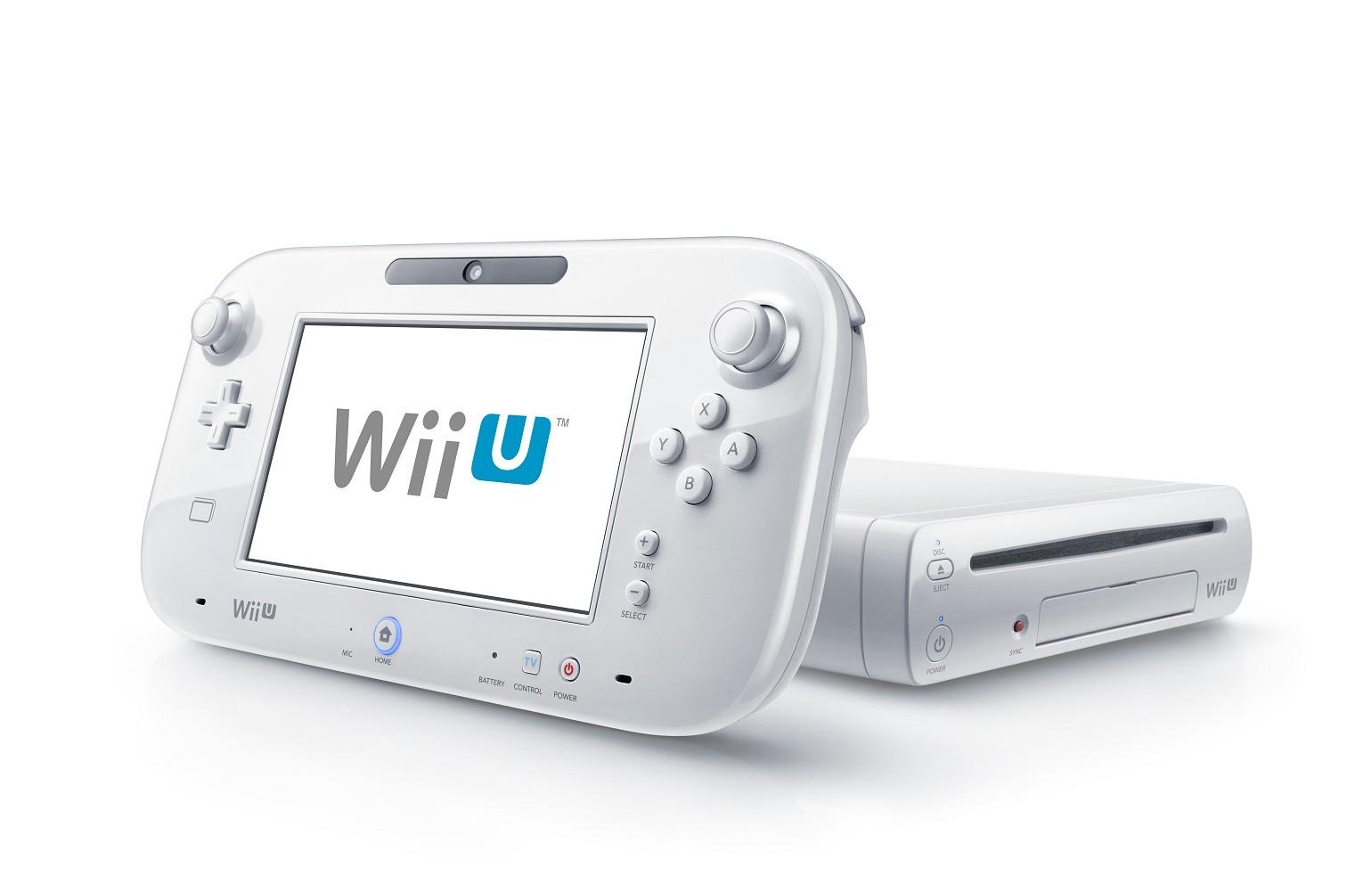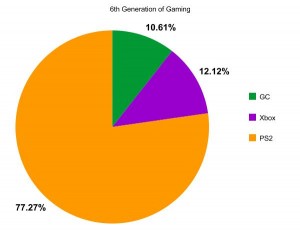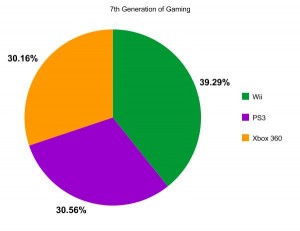Opinion: Why people shouldn’t worry about the Wii U
I have been reporting on this industry for over 7-years now. I have seen many changes throughout the years, some good, and some bad. Right now the industry is at a very volatile state. What is happening now is very similar to the video game crash of the 80’s, which was an issue of over saturation of choices. Just take a look at the end of 2013. This fall there will be a ton of “AAA” titles to choose from: new Call of Duty, GTA V, Pikmin 3, new Mario Game, probably another undisclosed Nintendo game, and this is just naming a few. All of these games release dates probably fall within a three-month period. With all these choices, and $100 million budgets, things have become rough for the industry.
There are probably a million other reasons for the decline of the video game industry, but that really isn’t the main focus of this piece. In my humble opinion, I think the industry miss-judged the growth of the casual market by assuming that growth would maintain itself through the years. Let us face the fact that the Wii was an anomaly. No one truly predicted, or knew, just how successful the Wii would become. Nintendo did a great job bringing in a new “gaming” crowd to the fold, but the idea that this crowd would follow it into the next generation is just simply silly.
The Wii U is far from perfect and the low sales of 50,000 units sold in January are shocking but that doesn’t mean the Wii U is doomed. Let us put our fanboy-ism aside and just look at the pure numbers. What most “experts” are comparing the Wii U sales to is the anomaly that was the Wii. The Wii factor had a ripple effect that spread across all platforms, bringing in this new type of gamer. This caused the video game industry to do something that it wasn’t very comfortable with, going main-stream. One can say around 35 percent of the Wii’s sales came from your parents, grandparents, and every other establishment that wanted to seem cool by having a video game system. This is the anomaly; the new “gamers” that were brought into the industry that were never part of it before. To truly get a sense of how a system is doing, we should first take a look at the industry before this anomaly occurred. In order to do this, we should probably go back and take a look at the 6th generation of gaming: Game Cube, PS2 and Xbox. According to reports, the GC sold just about 3.5 million systems in its first six months, with a total of just about 6.7 million for the first year. Now let us be fair and compare the best selling system of that generation, the PS2. In the first year for the PS2, it only sold 1.41 million, which is about 40% less than the GC. The GC went on to sell over 21.74 million units, while the PS2 went to move 153.2 million units. At the end of Nintendo’s financial quarter, December 31, the Wii U has sold just over 3 million units.
Now let me throw some more of these numbers at you. The Xbox sold around 24 million units, which brings the total system sales of the 6th generation (Xbox, PS2, GC) to around 199 million units sold. Now let us go back to the anomaly years. The Wii sold around 99 million while the PS3 and 360 sit at 77 million and 76 million respectively. Add everything together and we get a grand total of 252 million units sold for the 7th generation, which I would like to note has been the longest generation. With some quick math, that is a growth of about 26% between the sixth and seventh generation of consoles. This growth may be skewed by the fact that this generation saw the biggest re-buy rate of any generation. With all the different console variations, I am sure we all know people who have bought two or three PS3’s, 360’s and Wii’s to an extent. Taking out the entire re-buys, one could lower that 26% growth to about 20%. That means, even with the anomaly of the Wii and the frenzy it caused, the video game market really only grew 20% during the 7th generation, which I would like to point out again lasted over 7 years. That comes out to about a 3% growth a year for the industry.
I know some of you are screaming at your devices, “What about this?!” or “What about that equation?!” I really do not know what the future will hold for Nintendo, the Wii U or the industry. All I know, according to history, is it’s hard to judge a system by its first three months. There is still a long battle ahead before we can claim the world is coming to an end.
Now, with all these facts, can Nintendo really pull off this 8th generation of gaming? The simple answer is most likely yes. It was once eloquently stated, “A true gamer owns more than one system.” The gamer loves playing games. A person who just plays sports games isn’t really a gamer but a sports fanatic. A person who just plays racing games is not really a gamer but a racing fan. I will use myself as an example. Obviously, my favorite systems have everything to do with Nintendo. But I also own a 360 and love the Halo and Gears of War franchises, which are 360 exclusives. I have no problem owning more than one system to make sure I have an opportunity to play a wider range of games. This gamer loyalty that people have is a false persona. Yes, like myself, one may lean more towards one system but is still very much interested in other games. For most people, the PS3 and 360 are similar enough that some may find no reason to buy both. Except for the few games that were named above, and games like God of War and Little Big Planet, both the PS3 and Xbox 360 share pretty much the same games. That is where Nintendo comes in. Nintendo offers a different enough system and types of games that keep gamers interested. There are those people who are saying that the Mario and Zelda franchises are getting old, and they may be, but this brings me to my next point.
Nintendo may have saved themselves by not going HD with the Wii. The Wii not being HD didn’t bother me for a few years, but it slowly got to the point that I was tired of looking at Wii games and preferred playing some other system (Skyward Sword was an exemption). By looking at the sure success of the Wii, one cannot say that it was a mistake for Nintendo to leave out HD. A lot of heat is put on the Wii U specs, but specs are not everything. The Wii U can do and handle a lot more than the PS3 or 360. Now, will the next systems be more powerful than the Wii U? That is a definite yes, but that may not matter.
The Legend of Zelda Ocarina of Time is a lot of people’s top game of all time, and that isn’t necessary a reflection on how good the game was. Yes, OoT is a great game and, yes, it was one of the first 3D adventure games, but that may not be the whole story of why it sold so well. Zelda was one of Nintendo’s top franchises at the time. Nintendo fanboy’s ooooed and awwwed over the fact their beloved Link was finally in a 3D world. Much like the excitement of Zelda making the transition into a 3D world, Zelda fans will celebrate and rejoice to see this beloved franchise in HD. I will agree that the Zelda franchise needs to be refreshed, but let us all be honest with ourselves, even if the Wii U Zelda is the exact same formula, it is still a Zelda game in HD!
The same can be said for any other Nintendo franchise. Take a look at the excitement around Pikmin 3. Arguably, Pikmin could be one of Nintendo’s least recognizable franchises, but talk to any Pikmin fan and they will tell you how excited they are for this HD version of the game. Ask any Metroid fan how awesome it will be for a HD FPS Metroid game on the Wii U. When you are done with that, ask anyone who played Super Mario Galaxy how great a Galaxy type game would be in full HD. This isn’t even talking about Brawl or Mario Kart. I know someone will say that these are all stale franchises, but I want you to look at yourself in the mirror and try to tell yourself you wouldn’t give them all one more chance in an HD environment.
By just looking at the numbers it is very hard to tell what will happen to a system after just 3 months. In fact, not even a full year tells the whole story. There is so much that goes into making a system a “success.” All I know is the Wii U still has a long life ahead of it and it is way too early to count it out.





February 21, 2013
Good article. The Wii U sales may have slowed after the first month, but over 3 million is such a short period of time is certainly nothing to sneeze at! Anybody who is forecasting doom and gloom for Nintendo are ignorant, and time will prove this once again.
February 21, 2013
I admit, I lean strongly towards Nintendo and I have to say the PS4 announcement has everyone in a huge hubbub and I got somewhat intimidated. But then I remembered Nintendo has never let me down and they still have a whole console to explore still. Untapped potential is what it is with the Wii U right now. PS4 may look all fancy now and I’m not saying it’s bad, I just really want Nintendo to succeed.
February 22, 2013
I still think part of the slow sales is the poor name choice. A lot of casual gamers, or gamers that aren’t plugged into the news don’t know it’s an entirely new system. I can’t believe how many friends I’ve told that it’s a new console. This will wear off in time. I believe in Nintendo, and I know they have a lot to offer in with the Wii U in the coming years.
February 22, 2013
I can’t wait to see what is to come for the Wii U. Nintendo did such a great job creating a revolution in gaming with the Wii and I have been very impressed with what has been shown off for the Wii U so far. The hardware just released late last year and despite the delay of many games there is still much more to come. I look forward to seeing what developers have up their sleeves at this years E3!
February 28, 2013
Late, I realize, but this piece is rather flimsy. There are a lot of assumptions here, and much of the data is cringe-worthy in how misleading it is. Comparing 2 months of PS2 sales with 7 months of GC sales…
It’s pretty poorly constructed. There is far too much dead space that needs to be cut out; it’s about 20% longer than it needs to be.
March 6, 2013
“The Legend of Zelda Ocarina of Time is a lot of people’s top game of all time, and that isn’t necessary a reflection on how good the game was. – Nintendo fanboy’s ooooed and awwwed over the fact their beloved Link was finally in a 3D world.”
Great article, but I have to respectfully disagree there. Ocarina of Time played a huge part in what made me a Nintendo fan. I wasn’t a big fan of Nintendo back in 1998, but when I played that game it blew my mind regardless. I distinctly remember a time when this small-time band came to my elementary school to perform, and after their performance they took in some questions from the audience. One student asked whether or not any of the band members played video games, well the response was the lead singer shouting “Legend of Zelda: Ocarina of Tiiiiime!!” followed by everyone cheering and applauding.
I guess everyone in that gymnasium must have been a Nintendo fanboy.
July 10, 2013
[…] can truly predict the outcome. Before I go on, I would like to point you back to part one of “Why people shouldn’t worry about the Wii […]